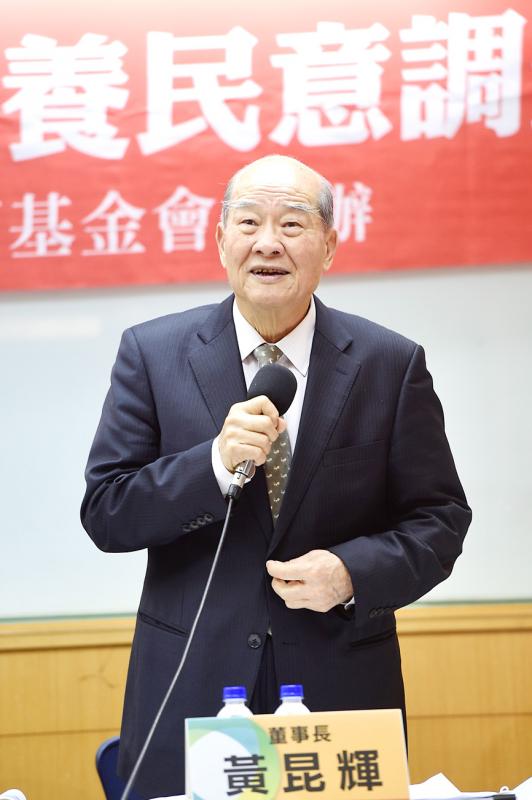A majority of respondents in a survey on civic and national consciousness said that Taiwanese generally demonstrate a sense of identification with Taiwan, the Professor Huang Kun-huei Education Foundation said yesterday.
Asked about the issue of national consciousness, 91.7 percent of respondents said that it was important for Taiwanese to cultivate a sense of identification with the history and culture of Taiwan, and 74.5 percent said they felt that Taiwanese generally demonstrated this.
The survey found that 89.1 percent said it was important for citizens to “be proud of being Taiwanese,” and 74.4 percent felt Taiwanese generally showed such behavior.

Photo: George Tsorng, Taipei Times
According to the poll, 94.5 percent of respondents felt it is important that Taiwanese “strive to fulfill their responsibilities as citizens, and to safeguard the safety and interests of the nation,” and 67.6 percent felt that Taiwanese generally met the expectation.
The survey found that 89.8 percent felt it is important for Taiwanese to see Taiwan as a sovereign nation and not part of another country, and 73.2 percent felt that Taiwanese generally demonstrated such an understanding.
“Since it began holding direct elections in 1996, Taiwan has been seen by the international community as a free, democratic nation. Taiwanese are proud of their democracy and free society,” foundation chairman Huang Kun-huei (黃昆輝) said.
However, Taiwanese still generally lack a spirit and consciousness of democracy and the rule of law, he said, adding that the issue seemed to stem from a failure to cultivate a national consciousness throughout the period of democratic reforms.
For example, survey respondents said that it was important for citizens to show concern for social issues, to distinguish between real and fabricated news, and to avoid disseminating fabricated news and disinformation, he said.
However, respondents also said that Taiwanese tend to perform the worst on these issues, he said.
The online poll surveyed 4,000 people, of which 1,848 completed the survey, foundation poll committee convener Kuo Sheng-yu (郭生玉) said.
The poll was divided into categories on several topics, including concern for social issues, the implementation of democracy and the rule of law, national consciousness, concern for environmental issues and issues related to scientific progress, he said.
“While the respondents felt that Taiwanese largely identified with a national consciousness, they also felt that Taiwanese are not living up to their responsibilities as citizens. This is worth paying attention to,” he said.

Taiwanese scientists have engineered plants that can capture about 50 percent more carbon dioxide and produce more than twice as many seeds as unmodified plants, a breakthrough they hope could one day help mitigate global warming and grow more food staples such as rice. If applied to major food crops, the new system could cut carbon emissions and raise yields “without additional equipment or labor costs,” Academia Sinica researcher and lead author the study Lu Kuan-jen (呂冠箴) said. Academia Sinica president James Liao (廖俊智) said that as humans emit 9.6 billion tonnes of carbon dioxide compared with the 220 billion tonnes absorbed

The Taipei Mass Rapid Transit (MRT) Wanda-Zhonghe Line is 81.7 percent complete, with public opening targeted for the end of 2027, New Taipei City Mayor Hou You-yi (侯友宜) said today. Surrounding roads are to be open to the public by the end of next year, Hou said during an inspection of construction progress. The 9.5km line, featuring nine underground stations and one depot, is expected to connect Chiang Kai-shek Memorial Hall Station to Chukuang Station in New Taipei City’s Jhonghe District (中和). All 18 tunnels for the line are complete, while the main structures of the stations and depot are mostly finished, he

Taipei is to implement widespread road closures around Taipei 101 on Friday to make way for large crowds during the Double Ten National Day celebration, the Taipei Department of Transportation said. A four-minute fireworks display is to be launched from the skyscraper, along with a performance by 500 drones flying in formation above the nearby Nanshan A21 site, starting at 10pm. Vehicle restrictions would occur in phases, they said. From 5pm to 9pm, inner lanes of Songshou Road between Taipei City Hall and Taipei 101 are to be closed, with only the outer lanes remaining open. Between 9pm and 9:40pm, the section is

China’s plan to deploy a new hypersonic ballistic missile at a Chinese People’s Liberation Army Rocket Force (PLARF) base near Taiwan likely targets US airbases and ships in the western Pacific, but it would also present new threats to Taiwan, defense experts said. The New York Times — citing a US Department of Defense report from last year on China’s military power — on Monday reported in an article titled “The missiles threatening Taiwan” that China has stockpiled 3,500 missiles, 1.5 times more than four years earlier. Although it is unclear how many of those missiles were targeting Taiwan, the newspaper reported